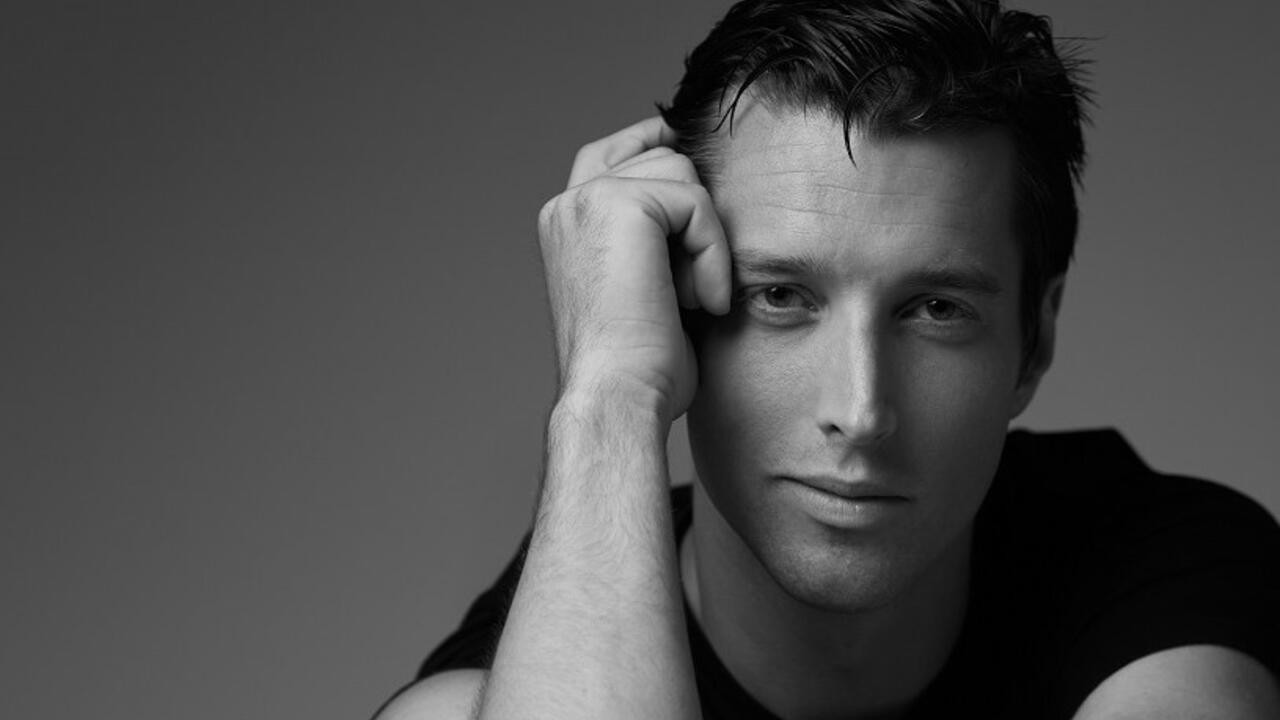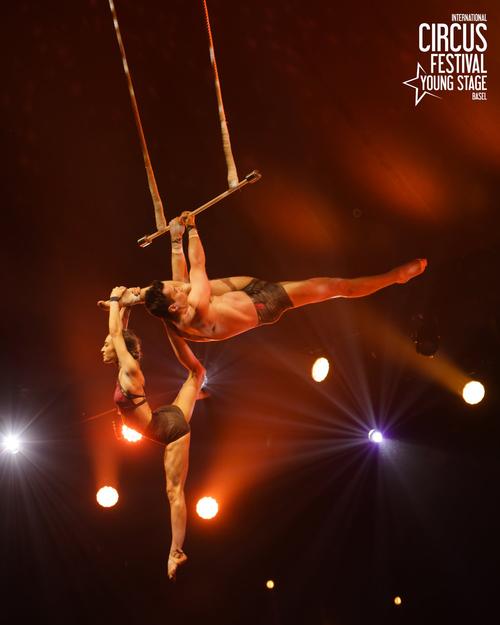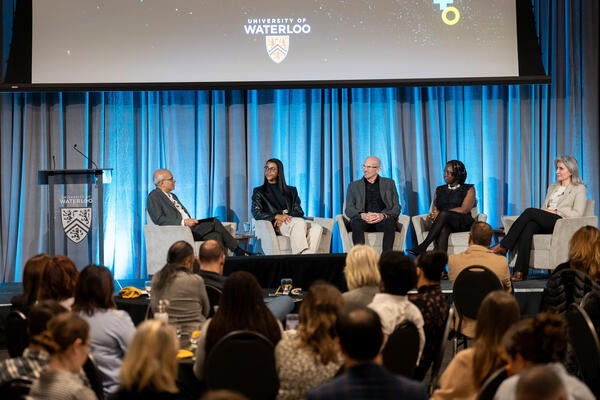
Flying high with Cirque du Soleil - an alumnus’ story
Trapeze artist Xander Taylor (BSc ’09) recently joined Cirque du Soleil's show TOTEM, performing his duo trapeze act with partner Mélanie Dupuis for their European tour.

Trapeze artist Xander Taylor (BSc ’09) recently joined Cirque du Soleil's show TOTEM, performing his duo trapeze act with partner Mélanie Dupuis for their European tour.
By Dana Ciak Office of AdvancementTrapeze artist Xander Taylor (BSc ’09) recently joined Cirque du Soleil's show TOTEM, performing his duo trapeze act with partner Mélanie Dupuis for their European tour. No stranger to the stage, Xander began his journey as a performer at an early age as an artistic gymnast and a Canadian competitive diver. He was also involved in theatre and public speaking competitions.
After receiving training in classical theatre from Sheridan College, Xander went on to complete his undergraduate degree in Kinesiology from UWaterloo, then later graduated from Montreal’s National Circus School.
His work has won awards at renowned circus festivals such as Cirque de Demain, and has brought him to stages on Broadway, London’s West End, and other venues across North America and Europe.
Congratulations on Cirque du Soleil TOTEM! Can you tell us about what it will be like to train/perform for the largest and most prestigious theatrical production in the world?
In a Cirque du Soleil big top show, you spend approximately two months in a city performing 10 shows a week, followed by a one to two week break as the tent moves between sites. It can be quite intense, as you arrive several hours in advance for additional resistance training, physiotherapy, makeup, and any needed show rehearsals … all of which happen prior to the show. You definitely get into a physical grind, but there’s still something electric that invigorates you the moment you step on that stage and hear the crowd.

You took an interest in trapeze at the age of 9. What sparked this interest for you?
I fell in love with circus and acrobatics at an early age for two reasons. To start, I saw my first Cirque du Soleil show at that age, and was completely in awe of these feats that seemed physically impossible. From then on, I wanted to understand and learn about the training that went behind these incredible performances, so I spent my youth competing in gymnastics and diving. Secondly, as silly as it may sound, it was from watching Xena Warrior Princess on TV. There was a lot of stunt work that went into that show, and also many parallels to circus with their way of including special effects and over the top character work.
You have done trapeze work for an exciting client list ranging from Dreamworks to NBC. Can you tell us about some of these projects?
The circus industry is in a very exciting period presently, as it now extends beyond what most of us know to be circus, which is either the traditional circus with animals, Cirque du Soleil, or the other contemporary companies performing on established stages. We’re now seeing more partnerships with film, television, opera, arena tours for pop stars, and multimedia in general.
I’ve been lucky enough to work with stage adaptations for companies like Dreamworks, in an acrobatic show based off their movie Madagascar. My circus career unexpectedly found its way into musical theatre, as a featured trapeze artist on Broadway with Cirque du Soleil’s Paramour. For tour publicity purposes, we are sometimes performing segments on TV shows such as Good Morning America and The Today Show. Furthermore, television series are starting to provide exciting opportunities for artists who also have abilities in acting, singing and dancing.
Did your time at UWaterloo influence your career aspirations?
Absolutely! I think deciding on a career path is rarely straightforward, and studying Kinesiology at UWaterloo was me following my interests at that time. I had dropped out of classical theatre training at Sheridan College, having felt that there was something missing. Completing my undergraduate degree at UWaterloo afterwards allowed me to return to competitive diving as well as deepen my understanding of subjects such as biomechanics and muscle physiology as they pertain to acrobatic training. I equipped myself with a degree that could lead me into either sports physiotherapy or any unexpected opportunities that could present themselves after graduation. As luck would have it, my first circus contract presented itself a month after graduating, and I haven’t looked back since.
What advice do you have for young alumni looking at getting into the entertainment business?
First of all, it would be to do the research about the industry you’re looking to get into. Not just to look on a website and submit an application, but to go in and talk to potential employers, request to job shadow, and also ask questions of peers in the industry. Many people in entertainment, whether it be from the performance or technical side, end up being surprised that it is not all glitz and glamour. There is a lot of instability, from both an occupational and personal standpoint. Much of the work is freelance and unpredictable, and while travelling the world is wonderful, it can also make it difficult to maintain relationships, friendships, or build a family. You need to weigh all that against the passion for what you do.
Secondly, it would be to highlight your diversity in skills. If I had continued pursuing work solely as an actor, I doubt my career would have gone nearly as far. I’ve found myself in certain contracts coaching and managing other artists, while also performing a trapeze number, catching my breath to sing to the public, climbing to operate a spot light, and jumping straight down into a Bollywood dance number. Your degree is what you make of it, and highlighting your various skill sets to employers or producers, will give them more options to fill their requested profiles.

Read more
Waterloo student fosters inclusivity through health studies and student clubs to enhance the experience of Black life in Canada

Read more
Global Futures 2024 launch event engages dialogue and action on the world’s complex challenges

Read more
Navigating science, advocacy and the pursuit of global health equity amidst climate change at COP28
The University of Waterloo acknowledges that much of our work takes place on the traditional territory of the Neutral, Anishinaabeg and Haudenosaunee peoples. Our main campus is situated on the Haldimand Tract, the land granted to the Six Nations that includes six miles on each side of the Grand River. Our active work toward reconciliation takes place across our campuses through research, learning, teaching, and community building, and is co-ordinated within the Office of Indigenous Relations.